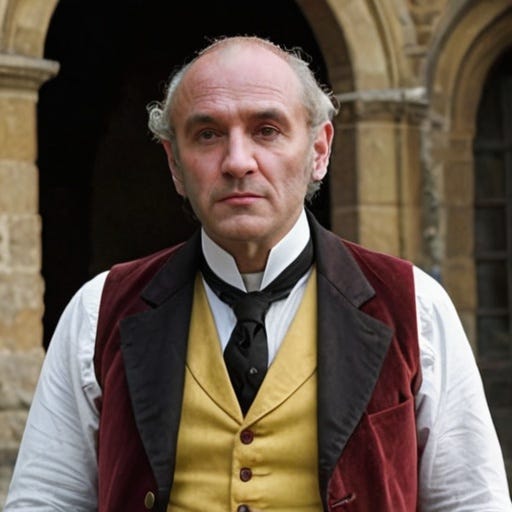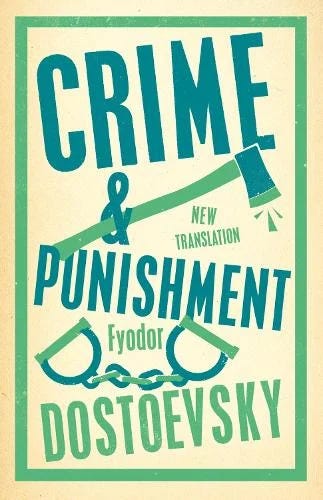Welcome to Week 2 of my slow-read of Crime and Punishment. This week’s chapter is Part One, Chapter 2.
Please bookmark the homepage for the read-along. Here, you’ll find links to everything you need as we read the novel together.
Request a Translation Comparison
Paid subscribers may request translation comparisons for anything that jumps out in whatever translation you’re reading.
Once requested, it will be added to the public translation comparison spreadsheet.
If you enjoy this content and would like to help me to keep it going, please consider a paid subscription.
Thank you. 🙏🏻
This week’s characters
Characters in this week’s chapter in the order that they are mentioned:
Raskolnikov • Marmeladov • Lebezyatnikov • Katerina Ivanovna • Sonya • Amalia Lippewechsel • Darya Frantsevna
Part One, Chapter 2 Synopsis
All quotations in this post are taken from Roger Cockrell’s translation of 2022, Alma Classics, © Roger Cockrell 2022
We left Raskolnikov in a tavern, where he’d gone in an agitated state after his run-in with Alyona Ivanovna. We got the feeling that he was going to call off the planned murder, considering it as ‘filthy, nasty, vile — so vile!’
It opens with one of the first paragraphs that strongly resonated with me, perhaps because I found it so relatable:
But now he suddenly felt drawn to being among other people. Something new seemed to be happening to him, something that included a yearning for the company of others. He felt so tired after an entire month of such unremitting anguish and miserable turmoil that he longed, if only just for a moment, to find peace and rest in some other world, no matter what form it might take. Despite, therefore, the filth of his surroundings, he was now happy to stay where he was: in the tavern.
We get the sense that Raskolnikov gets in his own way. That yearning for human connection is smothered by the distractions he engages in, foremost among which is his deep interiority that can make other people seem like annoyances to be avoided at all costs. Raskolnikov is an overthinker. But that yearning for connection is still there under the blanket, and if he would only relax, he would feel more at one with the world and his sense of anxiety and depression might ease off.
What’s the cause for this malaise? We’re not told, so we can only speculate. Is it poverty? We did read in Chapter 1 that he was ‘crushed by poverty’, and we get a reminder of that later on in Part Two, Chapter 1. Or perhaps he would be diagnosed with ADHD or autism in today’s world. We were told about his state of hypochondria in the previous chapter. Or maybe there’s trauma in his background that he’s avoiding. That’s certainly what Professor Yuri Corrigan believes.
It’s only in the later writing [of Dostoyevsky] that the fear of the inward (the traumatic memories that send his early characters fleeing outward) gives way to a deeper, more overwhelming terror of something within and beyond the self, the indwelling energies of the “living God” that haunt and oppress the waking minds of Raskolnikov and Ivan Karamazov, among so many other characters.1
As soon as the drunk at the bar—who we soon learn is retired civil servant Marmeladov—strikes up a conversation with Raskolnikov, that spark of desire for human connection is immediately extinguished.
Despite his recent, fleetingly expressed desire to engage with other people, no matter what form it took, the effect of someone else now actually directly addressing him suddenly awoke in him his usual unpleasant and irritable dislike of any strange person who approached or attempted to approach him.
So he wants to connect, but when an opportunity presents itself, he shrinks into himself.
A one-sided conversation follows, in which Marmeladov regales Raskolnikov about his woes. It goes on for some twelve pages. Here is a broken man, an alcoholic who goes so far as to sell his wife’s stockings for drink and begs money from his daughter to drink away his hangover. He’s been on a drinking spree for six days at this point.
Marmeladov introduces himself with this nugget of wisdom:
‘My dear sir,’ he began almostly solemnly, ‘to say poverty is not a crime is perfectly true. Yet I also know that drunkenness is not a virtue – and that’s even truer. But destitution, my dear sir… destitution is a vice. When you are poor, you are able to retain your inherently noble feelings and sentiments, but when you are destitute… never!
Garnett describes his manner of speech as ‘grandiloquent’ and Cockrell as ‘unusually flowery’. It is peppered with references to the New Testament, so he’s clearly an educated man who knows his bible.
Everyone knows it all anyway, ‘for there is nothing hid that shall not be known’2. And my response is not one of scorn, but one of humility. So be it! So be it! ‘Behold the man!’3
During his twelve-page rant, we’re introduced to a whole host of new characters. His long-suffering wife, Katerina Ivanovna and her three children, his daughter from his first marriage, Sonya—who provides him with his hair-of-the-dog money he’s currently drinking away—, Amalia Ivanovna Lippewechsel, landlady of the Marmeladovs’ apartment, Lebezyatnikov, who beats Katerina Ivanovna after Sonya rejects his sexual advances and Katerina Ivanovna stands up for her.
We learn of his daughter Sonya’s occupation as a prostitute, which she was more or less coerced into by her stepmother. There’s a tender scene when Sonya comes home from her first encounter with a client with 30 silver roubles. She covers herself with a blanket and sobs. Katerina Ivanovna comes over and kisses her feet. There’s a real New Testament vibe here, and it shows compassion on Katerina Ivanovna’s part. That’s not an emotion we see from Katerina Ivanovna often in the novel, which is not really surprising, given her circumstances.
We learn that Katerina Ivanovna is a widow and Marmeladov is a widower, so they are both in their second marriage. Marmeladov sees his marriage proposal as having been a magnanimous act to rescue Katerina Ivanovna from poverty and having to raise three children as a single mother. He feels that she’s out of his league, and expresses gratitude and wonder at her accepting his proposal.
Once again, poverty plays a lead role in the lives of the Marmeladov family. Were it not for Marmeladov’s propensity for alcohol, their circumstances would undoubtedly be different. He steals what’s left of the money Sonya earned from her first night as a prostitute, which is what he uses for his five-day bender. And in that single act, he lost his job again. Their chances are dire, which is why Raskolnikov takes pity on them before leaving their apartment after dropping Marmeladov home from the tavern and leaves some money behind on the windowsill. He soon regrets having done that, but it’s too late and he doesn’t go back, stating that ‘Sonya has to have make-up.’ It’s then that we get this wonderful quotation:
‘Man can get used to anything, the scoundrel!’
‘And what if I’m wrong? What if man really isn’t a scoundrel — I mean, man in general, as a whole? Then everything else is just prejudice, nothing more than contrived fear, and there will be no more barriers — and that’s how it should be!…’
What does this say about Raskolnikov’s worldview? Is he pushing himself towards his delusion of grandeur, towards that ‘new step forward’ we read about in Chapter 1? I feel that this ties in with his opening thoughts of wishing to connect with humanity, that man, ‘as a whole’, is good. But what of ‘no more barriers’? It could mean that everything is permissible if one simply has the gumption to take that step.
What do you think? Let me know in the comment thread.
Temporal Shift
There are a few of these temporal shifts from the narrator throughout the novel, when a scene is described as though looking back at it from the future. On forming a first impression of Marmeladov, we read that Raskolnikov was ‘often to recall this impression, even putting it down to premonition.’ It’s an example of fatalism, something we will come to over and over again in Raskolnikov’s inner monologues.
I’ll take note of whenever these look-backs crop up and pop them into my weekly updates.
Translation Points
I keep a spreadsheet of translation comparisons across the eight translations I’m reviewing. Each part and chapter is indicated in the left-most column. The one I’d like to bring up here is the ‘yellow ticket’.
Marmeladov tells Raskolnikov about his daughter’s being on a ‘yellow ticket’. It’s mentioned twice in a single sentence and is translated in a variety of ways:
Garnett: Yellow ticket / yellow passport
Coulson: On the streets / street walker
McDuff: Yellow card / yellow card
P&V: Yellow pass / yellow pass
Ready: Yellow ticket / yellow ticket
Pasternak Slater: Yellow ticket / yellow ticket
Katz: Streetwalker’s yellow ticket / streetwalking
Cockrell: Yellow ticket / yellow passport
The full text is in the spreadsheet. I have to say that a friend of mine and fellow translator rendered this as a ‘prostitution permit’, and of all the translations I’ve read, that’s my favourite!
I’ve recorded a video covering more translation points from Chapters 2 and 3.
Thank you for reading
Thank you for reading with me.
This book group is entirely funded by its readers. If you’re enjoying my posts, please consider a paid subscription to support me and this work.
Or if you’d rather just buy me a coffee, I’d be very grateful!
https://bloggerskaramazov.com/2017/11/15/riddle-of-the-self/
Matthew 10:26
Words spoken by Pontius Pilate (John 19:5)






Thank you for your thorough analysis, Cams! I do agree that at the end of the chapter Raskolnikov thoughts seem to take a leap into something new. No more barriers, that means freedom. Freedom of thought and of actions. It opens up this whole new world in which anything is possible (both good and bad). I wonder if this will lead to some form of inner approval of the murder of the old lady.
I also wonder what Marmeladow's function is in the novel. At first he seems not much more than a very eccentric, grandiloquent (such a nice word) character – whose behaviour towards his wife and children is abominable and cruel, though maybe he can't really help himself – but is he also some kind of beacon for Raskolnikov? I think the 'speech' Marmeladow gives just before he and Raskolnikov leave (about the sinners coming to God and being forgiven because they are miserable sinners) might play an important role in the development of Raskolnikovs way of thinking. I'd be happy to hear other people's opinions on this.